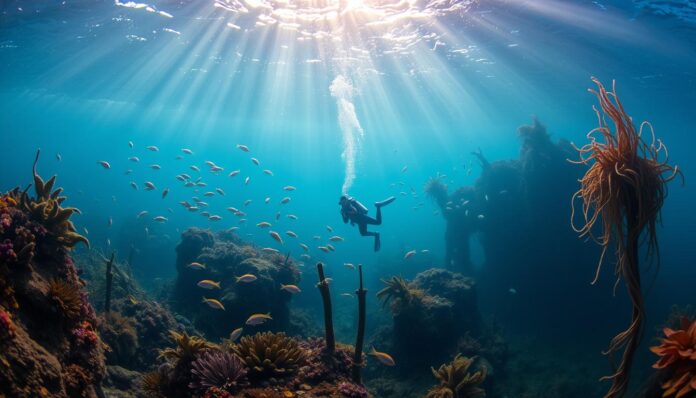| Best Time to Travel | Summer (June-August) |
| What to Expect | Visibility of up to 20 meters, cool water (43-64°F), varied marine life |
| Diving Conditions | Year-round diving, but best during the summer (warmer water, calmer seas) |
| Marine Life | Crabs, lobsters, anemones, sponges, fish |
Are you ready to explore a hidden underwater world? The Netherlands offers a unique Scuba Diving experience. It challenges what you thought you knew about diving in Europe.
The Netherlands has 850 diverse dive sites and a stunning maritime landscape. It attracts divers from all over the world. You can dive in the mysterious North Sea or the calm inland lakes.
Dutch waters are home to a surprising underwater world. Here, history, marine ecology, and adventure meet. Imagine diving into waters with over 10,000 shipwrecks, each with its own story.
Key Takeaways – Scuba Diving in The Netherlands
- The Netherlands features 850 unique dive sites across multiple regions
- Water temperatures range dramatically from -2°C to 24°C
- Diving experiences suit both beginners and advanced divers
- North Sea and Zeeland offer exceptional underwater landscapes
- Most dive sites are conveniently accessible from shore
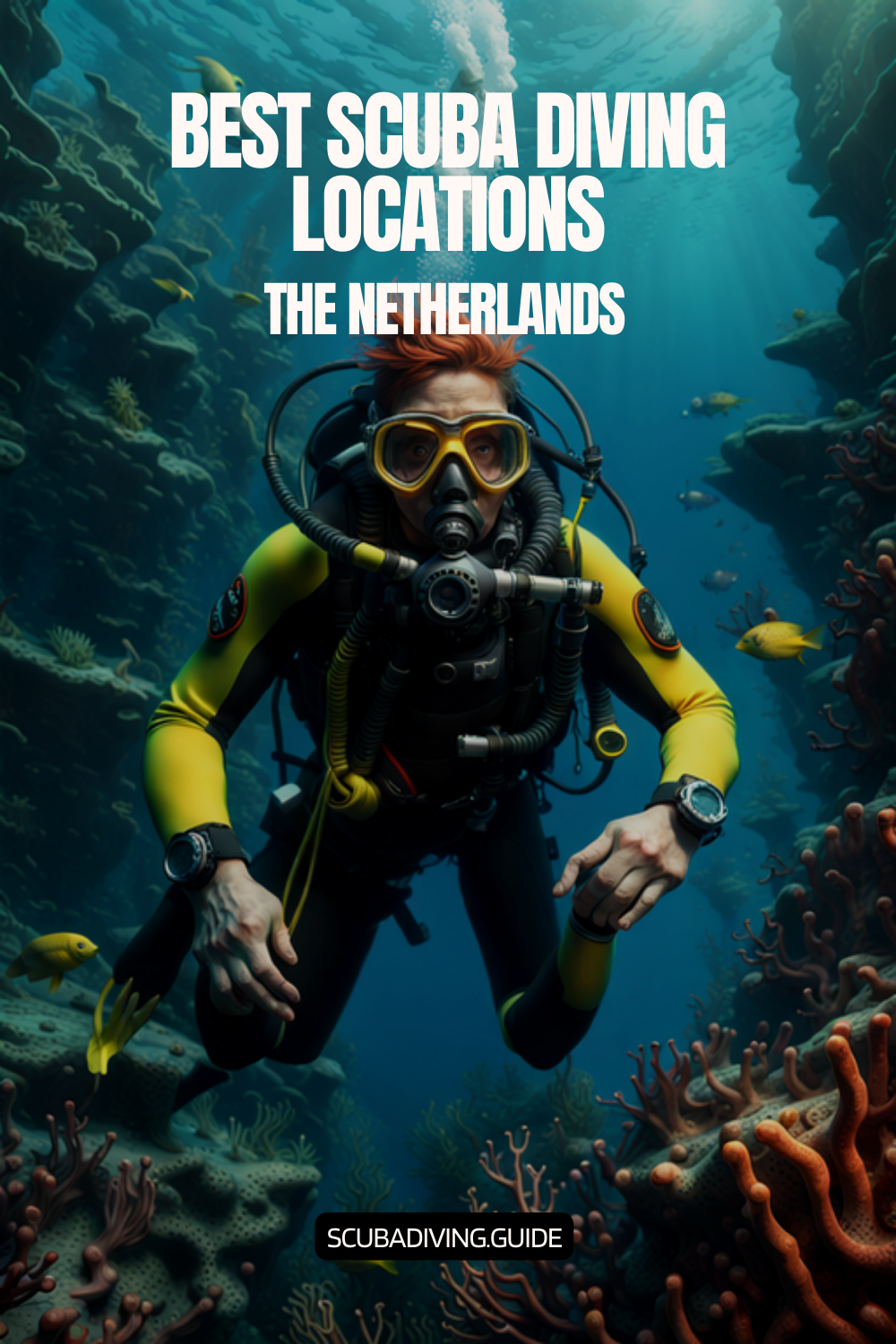
Overview of Scuba Diving in The Netherlands
The Netherlands has a unique underwater world that attracts divers from all over. With hundreds of dive sites, both inland and coastal, it offers a different experience than tropical places.
Scuba diving in the Netherlands requires careful planning. The water temperature can drop to 5 degrees Celsius in winter. But, it warms up a bit during summer.
What to Expect
Divers in Dutch waters will find a rich and varied experience:
- Mixed saltwater and freshwater dive sites
- Challenging visibility conditions
- Unique marine ecosystems
- Abundant shipwreck opportunities
Benefits of Diving in Dutch Waters
The Netherlands has many reasons to dive underwater:
- Rich Biodiversity: Places like Oosterschelde have over 250 marine species
- Historical maritime landscape with many shipwrecks
- Diverse diving environments from lakes to coastal regions
“Dutch waters offer a diving experience that transforms expectations and challenges conventional underwater adventures.”
Zeeland province, with about 39% water, is a top spot for diving. Lake Grevelingen, Europe’s largest saltwater lake, is home to many marine species like starfish and shrimp.
For those diving in the Netherlands, preparation is essential. Divers need proper cold-water gear and should know about tides. They also need to be prepared for changing visibility, which can be from 0.5 to 20 meters.
Best Diving Locations in The Netherlands
The Netherlands is a top spot for diving, attracting divers from everywhere. Dive Travel Netherlands offers a chance to see different marine worlds. With over 100 dive sites, divers can find amazing underwater scenes.
Choosing the right dive spot in the Netherlands is key. Each area has its own special marine life and underwater views. These vary by skill level and what you like to see.
The Frisian Islands
The Frisian Islands are a great place for diving. They have many entry points:
- Diverse marine ecosystems
- Options for shore and boat diving
- Unique underwater landscapes
Zeeland: A Diver’s Paradise
Zeeland is a top choice for diving in the Netherlands. It has:
- Grevelingen – Known for excellent visibility
- Oosterschelde – Recognized for diverse marine life
- Multiple entry points with extensive facilities
“Diving in Zeeland is like exploring an underwater museum of marine biodiversity.” – Dutch Diving Experts
North Holland Coastal Diving
North Holland is great for wreck diving. Divers can see unique North Sea species and explore coastal terrains.
The Wadden Sea
The Wadden Sea is a UNESCO World Heritage site. It offers a challenging dive experience. Divers need to be ready for strong currents and tidal changes.
Staying safe is important in Dive Travel Netherlands. Here are some tips:
- Maintain appropriate certification levels
- Use proper diving equipment
- Understand local marine conditions
Marine Life You Can Encounter
Exploring the underwater world in the Netherlands is a thrilling adventure. It shows a diverse marine ecosystem that amazes divers worldwide. This journey challenges what you might think about diving in the North Sea.
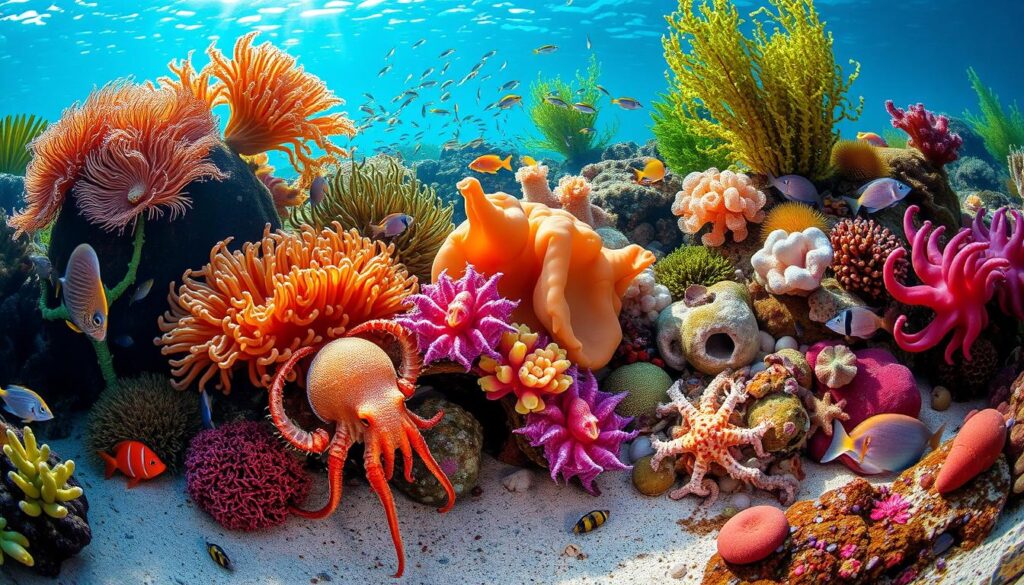
The Dutch underwater world is full of fascinating creatures and unique places. Every dive is a special experience. You’ll see many marine species in different underwater landscapes.
Fascinating Fish Species
The Netherlands’ waters are home to many interesting fish. Some of these include:
- Cod
- Pollock
- Various flatfish species
- Seahorses in specific regions
Unique Marine Inhabitants
The marine ecosystem has more than just fish. It’s home to creatures that make diving special:
- Lobsters hiding in rocky crevices
- Hermit crabs scuttling across the seafloor
- Colorful nudibranchs
- Flounders blending with the sandy bottom
Underwater Ecosystems
The Netherlands may not have tropical coral reefs, but it has amazing underwater landscapes. Grevelingenmeer, Europe’s largest saltwater lake, is a great place for divers.
| Location | Notable Marine Features | Visibility |
|---|---|---|
| Oosterschelde | Cuttlefish mating grounds | Good |
| Grevelingenmeer | Soft coral gardens | Excellent |
| Vinkeveense Plassen | Clear underwater landscapes | Up to 15 meters |
Seasonal Marine Spectacles
Some of the most exciting marine life encounters happen during specific seasons. In May, thousands of cuttlefish gather in Oosterschelde to mate, creating a breathtaking underwater spectacle for divers fortunate enough to witness this natural phenomenon.
“Each dive in the Netherlands is a journey of discovery, revealing the hidden wonders of marine life.” – Dutch Marine Exploration Society
Diving Season: When to Go
Scuba Diving in The Netherlands is a year-round adventure. Dive Travel Netherlands offers something for everyone, from beginners to experts. Each season has its own special charm.
The diving season in the Netherlands runs from March to November. This time allows for a variety of underwater experiences. The water’s temperature and how clear it is are key to planning your dive.
Best Times for Visibility
The best diving times are in summer, from June to August. During this time, the water can be as warm as 18°C. Visibility can range from:
- Minimum visibility: 50 cm
- Maximum visibility: 10 meters
- Average dive duration: 45 minutes
Weather Considerations
The weather greatly affects diving in The Netherlands. Divers need to be ready for:
- Temperature changes
- Wind and current shifts
- Changes in marine life
“Every season brings a unique underwater landscape in Dutch waters.” – Dutch Diving Association
Off-Peak vs. Peak Diving Times
While summer is the busiest time, the shoulder seasons have their perks. Early autumn, for example, offers dives with water around 14°C and fewer people.
| Season | Water Temp | Visibility | Recommended |
|---|---|---|---|
| Summer | 18°C | Up to 10m | Beginners |
| Early Autumn | 14°C | 5-8m | Experienced Divers |
Pro tip: Always check local diving conditions and prepare for your Scuba Diving in The Netherlands adventure!
Regulations and Safety Guidelines
Scuba diving in the Netherlands needs careful attention to safety and rules. Knowing the local diving laws is key for a safe dive. Scuba Certification Netherlands helps ensure divers are ready for Dutch waters.
Diving safety in the Netherlands follows strict rules. These rules protect divers and the sea. The country has detailed regulations for safe underwater exploration.
Diving Certifications Required
To dive, you need specific certifications:
- Open Water Certification (minimum requirement)
- Advanced Open Water for tough dive sites
- Specialized certifications for:
- Wreck Diving
- Dry Suit Diving
- Rescue Diver
Environmental Protections
Diving Safety Netherlands has strict environmental rules:
- Respect marine protected areas
- Follow look but don’t touch policies
- Minimize underwater disturbance
- Report any environmental concerns
Safety Equipment Essentials
Important safety gear for Dutch diving includes:
- Dive computer
- Surface marker buoy
- Dive light
- Thermal protection (dry suit recommended)
“Safety is not an accident. It’s a deliberate act of professional preparation.” – Dutch Diving Safety Experts
Divers must report to the Netherlands Labour Authority for deep dives or strong currents. Certifications last 4 years, with yearly health checks needed to stay certified.
Popular Dive Schools and Operators
The Netherlands has a wide range of dive schools and operators for all scuba lovers. With 110 dive operators in 25 regions, there are great chances for Scuba Certification Netherlands. You can also explore many underwater landscapes.
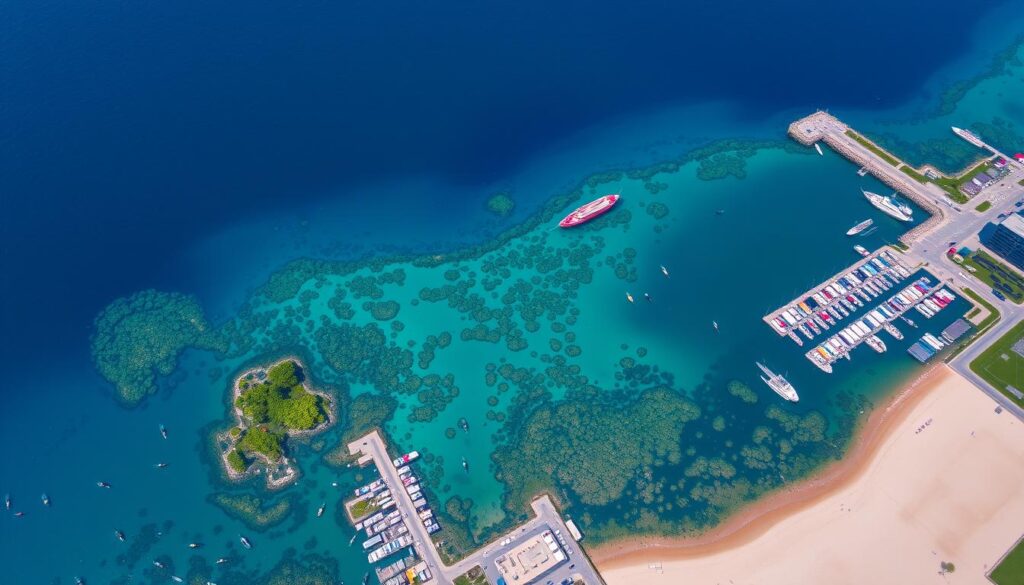
- Noord-Holland (12 operators)
- Zuid-Holland (12 operators)
- Noord-Brabant (11 operators)
- Utrecht (6 operators)
Recommended Dive Shops
Dive Center ‘de Grevelingen’ in Zeeland is a top spot for diving. It offers full diving services, including equipment rentals and guided tours. You can dive in places like Grevelingen and Oosterschelde.
Guided Tour Options
Many dive clubs in the Netherlands have special guided tours. These tours usually include:
- Transport to dive sites
- Equipment rental
- Help from a professional guide
- Safety briefings
Certifications Offered
Dive Clubs Netherlands offer full certification programs through well-known organizations:
| Organization | Certification Levels | Specialty Courses |
|---|---|---|
| PADI | Open Water to Professional | Dry Suit Diving |
| SSI | Beginner to Advanced | Technical Diving |
| NAUI | Entry to Master Level | Navigation Skills |
“Exploring Dutch waters offers an unparalleled underwater adventure for divers of all experience levels.” – Dutch Diving Association
Whether you want Scuba Certification Netherlands or to join Dive Clubs Netherlands, the country is full of opportunities. You can dive and learn a lot underwater.
Underwater Photography Tips
Exploring the underwater world in the Netherlands is both challenging and exciting. It requires special skills and equipment. It also demands respect for the marine environment.
Best Equipment for Beginners
For beginners, the right gear is key. Here are some must-haves:
- Compact camera with underwater housing
- External strobe or video light
- Macro and wide-angle lenses
- Color correction filters
Techniques for Capturing Marine Life
Mastering underwater photography takes patience and practice. Here are some key tips:
- Practice excellent buoyancy control
- Use slow, deliberate movements
- Approach subjects carefully
- Shoot from low angles
| Photography Technique | Best Practices |
|---|---|
| Macro Photography | Use 100mm lens, get close to small subjects |
| Wide-Angle Shots | Capture larger marine landscapes |
| Lighting | Use external strobes to minimize backscatter |
Ethical Practices in Photography
Responsible underwater exploration is key. Follow these guidelines to protect marine ecosystems:
“Observe, but never disturb. Your camera should capture memories, not create harm.”
- Never touch or manipulate marine life
- Maintain safe distance from creatures
- Avoid using flash on sensitive species
- Prioritize marine life welfare over perfect shots
By using these techniques and following ethical standards, photographers can create amazing images. They can tell the story of the Netherlands’ underwater world while keeping it safe.
Beginner Scuba Diving Courses
Exploring the underwater world of the Netherlands needs proper training. Scuba Certification Netherlands offers great chances for new divers to see Dutch waters’ unique beauty.
Aspiring divers can pick from many entry-level courses. These courses help build confidence and teach essential skills. Diving Safety Netherlands is a big deal for local dive schools. They make sure beginners get all the training they need.
Introduction to Scuba Diving
Most beginners start with introductory courses. These courses give a solid base for exploring underwater. They cover:
- Basic equipment familiarization
- Underwater communication techniques
- Safety procedures and emergency protocols
- Fundamental diving skills
What You’ll Learn
| Course Level | Minimum Age | Key Skills Learned |
|---|---|---|
| Discover Scuba Diving | 10 | Basic underwater navigation, mask clearing, regulator recovery |
| Open Water Diver | 15 | Dive planning, buoyancy control, emergency procedures |
| Advanced Open Water | 15 | Deep diving, navigation, specialized diving techniques |
Diving Practice Locations
Vinkeveense Plassen is a top spot for beginners. It’s a freshwater dive site with perfect conditions for learning. It has good visibility and controlled conditions.
“Learning to dive in challenging conditions like the Netherlands will make you a more skilled and confident underwater explorer.”
Dive schools across the Netherlands offer detailed training. They mix theory with practical experience. Students start in pools and then dive in open water. This way, they learn safely and gradually.
Advanced Diving Opportunities
Scuba diving in The Netherlands is a thrilling adventure for experienced divers. The Dutch waters offer unique challenges and exciting opportunities. Advanced divers can explore new depths and discover hidden treasures.
Technical Diving Expertise
Technical diving in the Netherlands requires special skills and gear. Divers can dive up to 40 meters with advanced training. The Technical Diving College in Hilversum offers courses to improve underwater skills.
- Depth range: Up to 40 meters (131 feet)
- Specialized equipment requirements
- Advanced certification courses
Wreck Diving Netherlands
Wreck diving in the Netherlands is an extraordinary underwater journey. The North Sea coastline has about 10,000 shipwrecks. This creates an underwater museum for advanced divers to explore.
| Wreck Diving Location | Difficulty Level | Depth Range |
|---|---|---|
| Zeeland Coastal Waters | Advanced | 20-40 meters |
| Oosterschelde | Intermediate to Advanced | 15-35 meters |
Night Diving Experiences
Night diving in the Netherlands turns familiar sites into mysterious landscapes. Divers can see nocturnal marine life in Zeeland. It’s a unique underwater experience.
“Night diving reveals the hidden secrets of Dutch underwater ecosystems.” – Professional Dive Instructor
Scuba diving in The Netherlands needs careful planning, advanced certifications, and a sense of adventure. The Dutch waters offer unique experiences for skilled divers, from technical diving to exploring wrecks.
Wildlife Conservation Efforts
The Netherlands is leading the way in marine conservation. Dive Clubs Netherlands are key in these efforts. They help protect our underwater worlds.
The Dutch National Scientific Diving Committee started in summer 2021. It’s a big step for marine research and conservation. Experts from top research institutes work together here.
Organizations Promoting Marine Health
Many groups focus on keeping the sea healthy in the Netherlands:
- North Sea Foundation
- Dutch Caribbean Nature Alliance
- National Scientific Diving Committee
How Divers Can Help
Divers play a big role in keeping Marine Life Netherlands healthy. By diving responsibly, they can make a big difference:
- Practice perfect buoyancy control
- Remove underwater trash during dives
- Follow “leave no trace” principles
Volunteer Opportunities
“Every dive is a chance to protect and understand our marine ecosystem” – Dutch Marine Research Team
Divers can help out in many ways, like:
- Marine life surveys
- Coral restoration projects
- Underwater cleanup events
- Citizen science research
The Dutch Scientific Diving Committee’s Expert Group is working hard. They make sure diving is both scientifically excellent and protects the environment.
Gear Rental vs. Purchase
Scuba diving in The Netherlands means you must think about your equipment choices. Renting or buying gear can greatly affect your diving adventure. The cold waters of Dutch diving require special gear.
Renting gear is great for those diving now and then or new to Scuba Diving in The Netherlands. Dive centers offer top-notch rental options, including dry suits for cold water. It’s a chance to try different gear without a big upfront cost. Brands like Cressi Ultralight BC and Scubapro Go BC are often available for rent.
When to Rent Equipment
Renting is best for travelers or those diving less than 20-30 times a year. It’s more affordable. Dive centers suggest checking gear after 100 dives, which can be hard for personal owners. Rental services keep the gear in top shape and up to date with safety standards.
Cost Comparison
Buying gear is better for those diving often. Brands like Sherwood Scuba Ventura BC and Hollis F1 fins last long and are worth the cost. Most gear needs service every 1-2 years. Local dive experts can help you choose the right gear for Dutch diving conditions.
The Netherlands Recommended Scuba Diving Itinerary
To make the most of your scuba diving adventure in The Netherlands, we recommend a carefully curated itinerary that takes you to some of the best diving locations the country has to offer. This itinerary combines a mix of coastal and inland dive sites, showcasing the diverse underwater landscapes and marine life that await you. Let’s dive into this recommended scuba diving itinerary:
Day 1: Arrival and Orientation
Upon arrival in The Netherlands, settle into your chosen accommodation, whether it’s a dive resort, hotel, or liveaboard. Take some time to familiarize yourself with the facilities and meet the diving staff. Attend an orientation session where you’ll receive an overview of the diving opportunities, safety procedures, and any additional information relevant to your stay.
Day 2-3: Zeeland Exploration
Start your diving adventure in the province of Zeeland, renowned for its remarkable dive sites. Head to Grevelingenmeer, the largest saltwater lake in Western Europe, known for its exceptional visibility and diverse marine life. Dive amidst submerged forests, encounter colorful fish, and explore intriguing rock formations. Continue your exploration in the Oosterschelde, an estuary that offers a wealth of marine biodiversity. Dive along the Zeelandbrug, exploring its vibrant pillars and encountering a variety of fish species.
Day 4-5: Wreck Diving in the North Sea
Travel to the North Sea coast, where you’ll have the opportunity to explore the captivating wrecks that lie beneath the surface. Dive the North Sea wrecks, remnants of World War II and other maritime histories. Discover the secrets of sunken ships, aircraft, and artificial reefs that have become habitats for a variety of marine life. The wrecks provide a fascinating glimpse into the past and offer unique and atmospheric diving experiences.
Day 6-7: Exploration of Inland Waters
Head inland to the lakes and rivers that offer intriguing diving opportunities. Dive in Lake Vinkeveen, a freshwater oasis known for its interconnected quarries and sunken treasures. Explore submerged boats, cars, and platforms while encountering pike, perch, and other freshwater species. Continue your inland exploration with dives in Haringvliet, a tidal river that blends saltwater and freshwater environments. Discover underwater dunes, seagrass beds, and rocky formations while observing the diverse marine and birdlife.
Day 8-9: Coastal Excursions and Liveaboard Experience
Return to the coastal areas for the final leg of your diving itinerary. Embark on a guided dive excursion along the Brouwersdam, where you can encounter schools of fish, crabs, and even seals. Alternatively, if you’re seeking an immersive and adventurous experience, opt for a liveaboard trip that takes you to multiple dive sites along the coast. Enjoy the convenience of staying directly at the dive sites, maximizing your diving time, and discovering hidden gems of The Netherlands’ underwater world.
Day 10: Departure
On your final day, take the time to reflect on your incredible diving experiences in The Netherlands. Bid farewell to the vibrant diving community you’ve encountered along the way and depart with memories of the captivating underwater landscapes and marine encounters. Ensure that you properly clean and store your dive equipment, and return any rented gear to the diving center or resort.
This recommended scuba diving itinerary provides a balanced mix of coastal and inland diving experiences, allowing you to explore the diverse underwater landscapes of The Netherlands. From vibrant reefs and wrecks to freshwater quarries and tidal rivers, each dive site offers its own unique charm and opportunities for marine encounters.
Remember to check weather conditions and consult with diving centers or professionals to ensure optimal dive planning and safety throughout your journey. With this itinerary, you’re bound to have an unforgettable scuba diving adventure in The Netherlands.
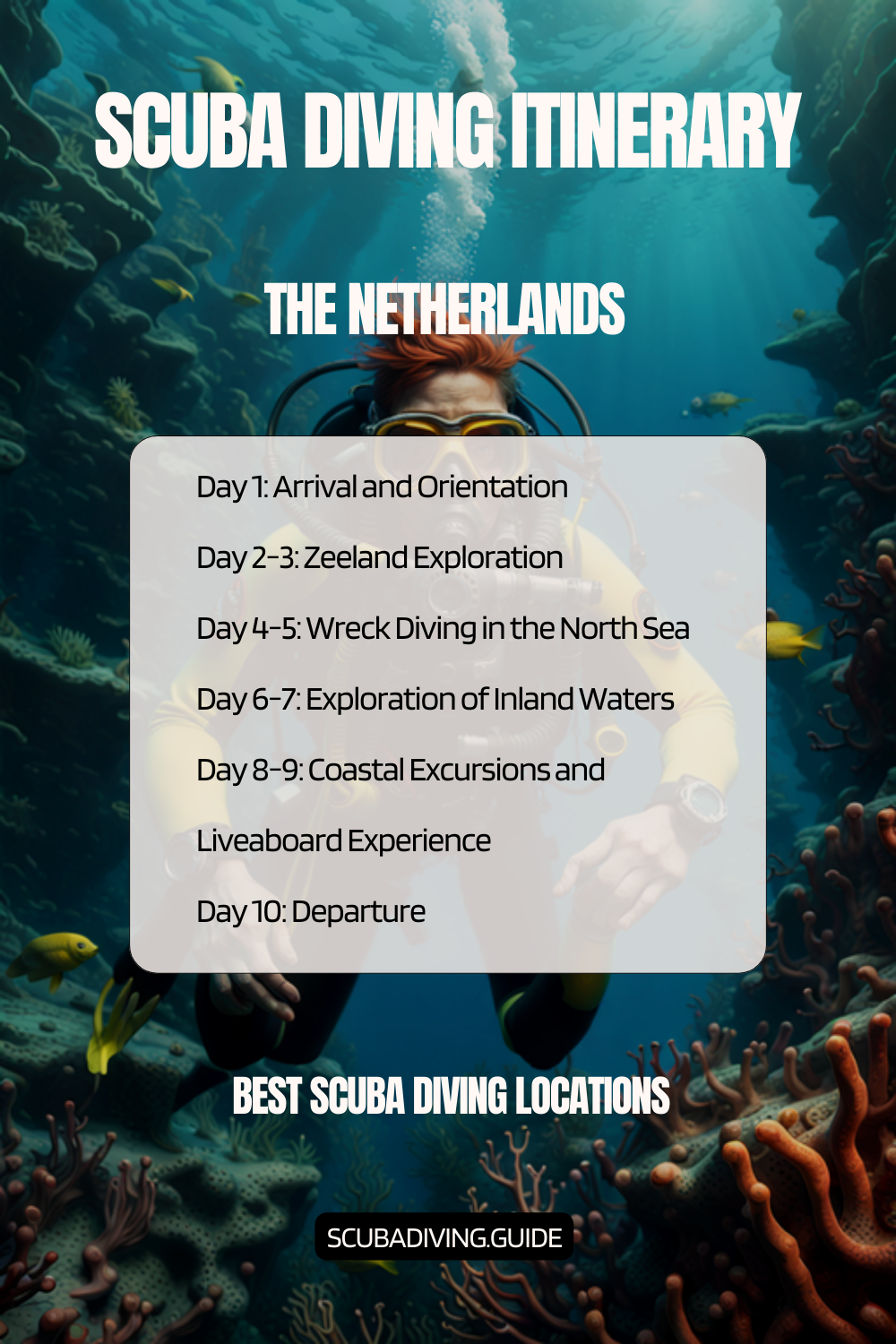
Other Countries to Consider
FAQ – Scuba Diving in The Netherlands
Do I need special certification to dive in the Netherlands?
Most dive sites need a minimum Open Water certification. Some advanced sites, like those in the North Sea, might require more. Always check the site’s requirements before diving.
What is the best time of year to go scuba diving in the Netherlands?
Summer (June to August) is the best time, with water up to 24°C (75°F) and clear visibility. Each season has its own charm, like cuttlefish mating in spring or clearer waters in winter.
What marine life can I expect to see while diving in Dutch waters?
You’ll see cod, pollock, flatfish, seahorses, and cuttlefish. The Oosterschelde is famous for its soft coral gardens and diverse marine life.
What type of diving equipment do I need for diving in the Netherlands?
A dry suit is recommended for cold water, even in summer. You’ll also need a dive computer, surface marker buoy, dive light, and thermal protection. 7mm wetsuits or dry suits keep you warm.
Are there good dive sites for beginners in the Netherlands?
Yes, Vinkeveense Plassen is great for training dives. Zeeland and other regions have beginner-friendly sites with calm conditions, perfect for new divers.
How cold are the waters for diving in the Netherlands?
Summer waters are around 24°C (75°F), while winter can be near freezing. Most use dry suits or thick wetsuits. Temperatures range from 5°C to 20°C (41°F to 68°F) by season.
What are the most popular dive locations in the Netherlands?
Zeeland, the Frisian Islands, North Holland, and inland lakes are top spots. Each offers unique diving experiences, from marine life to shipwrecks.
Can I rent diving equipment in the Netherlands?
Yes, dive centers and schools offer rental, including dry suits. They provide packages for all levels. Book in advance during peak season.
Are there conservation opportunities for divers in the Netherlands?
Absolutely! Dive clubs and organizations like the North Sea Foundation organize clean-up events. You can help through volunteer programs and responsible diving.
What certifications are available for divers in the Netherlands?
PADI, SSI, and NAUI are well-represented. Courses range from Open Water Diver to specialties like Dry Suit Diving. Dive centers offer programs nationwide.
